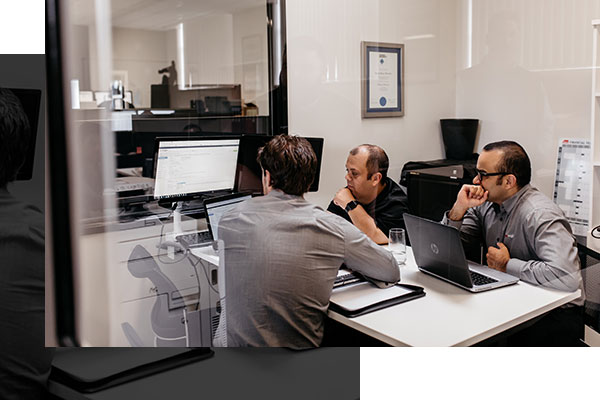No matter what events seem to be gripping the world, the tech gears are always turning. As the pandemic took hold, we turned to software solutions for contact tracing, digital check-ins, SMS test results and finally, digital vaccination certificates. In 2022, there are plenty of new exciting tech advances to look out for as the world finally begins to return to a semblance of normalcy. From smarter homes to AI workforces and hardware innovations, here are the biggest trends to look forward to.
1. Portable Monitors
When some of us headed home for a lockdown stint last year, seeing someone carrying a massive computer monitor to their car wasn’t the most unusual site. As hybrid and remote working become the new norms post-pandemic, portable monitors are having a moment. Lighter and thinner than typical computer monitors, you’ll get extra screen real estate as well as a more minimal setup given these monitors use fewer cables or a single USB port. They are also smaller than typical desktop monitors so work in more compact spaces such as travel fold-down tables or co-working spaces. Portable monitors come in a range of resolutions and sizes so you’re bound to find something that suits your needs. Some can even be attached to the back of your laptop so you simply flip them open when you need them. To discover more of the latest business technology and hardware innovations, you can always contact the friendly Evologic team.

2. Smart Homes Matter
For all of those people that lamented being home-bound, there was a strong contingent who made the most of enjoying their home nests and making great strides to improve it. So keen were we to secure our own corner of the world, home prices have surged beyond reason. It’s also led to greater investment in home technology to increase functionality and convenience. The word you need to know is Matter. In the works since 2019, this smart home interoperability protocol has over 170 companies involved in its development including Apple, Samsung, Amazon, Google and the Zigbee Alliance being the most prominent names.
But what is it? To make smart home technology seamless, companies are teaming up for a new smart home standard called Matter so it will be easier for you to buy smart home devices that work together. Matter uses a combination of Ethernet, wifi, Thread, and Bluetooth LE to connect. Its function is to take away the heavy lifting of setting up multiple gadgets to work together for a smarter home where devices can easily sync with each other, regardless of brand.

3. The Digital Workforce
No, we aren’t being replaced by robots, but more large organisations are looking to AI hires for automation-processing solutions. Armed with advanced intelligence and limitless capabilities, these AI workers are given personas and inboxes. Currently being employed across a range of industries, they are relieving existing staff members and departments of data-heavy manual tasks such as invoice processing, data input, supply analytics, report metrics and more.
The time they save is proving to be highly valuable to organisations, especially as they never take sick days or make mistakes. Digital workers also offer 24/7 capacity and faster processing through rules-based automation that delivers 100% accuracy. The only issue is not enough AI technology workers being available to meet demand in Australia.
According to a new report by the CSIRO “We estimate that by 2030 Australian industry will require a workforce of between 32,000 to 161,000 employees in computer vision, robotics, human language technologies, data science and other areas of AI expertise.” They also predict that the AI industry could be worth $22.17 trillion to the global economy by 2030.
4. No More Chrome Cookies
The ever-growing concern of privacy on the web will see the phase-out of third-party cookies by Google Chrome in 2022. Announced as early as January 2020, Chrome has named the operation Privacy Sandbox, stating “Once these approaches have addressed the needs of users, publishers, and advertisers, and we have developed the tools to mitigate workarounds, we plan to phase out support for third-party cookies in Chrome.”
They have acknowledged that their users want greater control over how their data is used and are on a mission to make cookies obsolete. While Chrome isn’t the first browser to phase-out cookies, it is the biggest. Firefox and Safari have already stopped cookies, but Chrome’s phase-out is set to have a bigger impact on businesses. In late 2019, Google Chrome made up more than 56% of the web browser market.
The good news is that first-party cookies that track basic data about your own customers are still allowed. This means functions such as stored log-in details and passwords will still work on sites you visit frequently.

5. Position Zero
SEO is always on the radar for businesses wanting to improve their web traffic and google rankings. Position zero is now considered the new first place when it comes to search engine results. Instead of simply appearing at the top of the pile after a search, your website will offer a featured snippet. Based on a range of factors including the words in a query, search intention and the search history, search engines can now deliver the required content in a short paragraph answer that does not require a clickthrough to the webpage. While this means the user viewing the snippet won’t count towards your web visitors, it is still a highly desirable and prominent position to achieve. So how do you do it? No search engine tactics deliver instant results, but expanding your keyword list and optimising content based on search intent is a good start. If in doubt, reach out to an SEO agency to help you on your way.
Stay ahead of the trends with Evologic
As your IT partner, Evologic can connect you with the latest technology. Contact us or call 1800 887 778.


